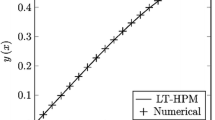Abstract
Based on the modified homotopy perturbation method (MHPM), exact solutions of certain partial differential equations are constructed by separation of variables and choosing the finite terms of a series in p as exact solutions. Under suitable initial conditions, the PDE is transformed into an ODE. Some illustrative examples reveal the efficiency of the proposed method.
Similar content being viewed by others
References
Attar, P.J., Vedula, P. Direct quadrature method of moments solution of the Fokker-Planck equation. J. Sound and Vibration, 317: 265–272 (2008)
Feng, G., Gao, X., Dong, W., Li, J. Time-dependent solutions of the Fokker-Planck equation of maximally reduced air-sea coupling climate model. Chaos, Solitons and Fractals, 37: 487–495 (2008)
Frank, T.D. Stochastic feedback, nonlinear families of Markov processes, and nonlinear Fokker-Planck equations. Physica A., 331: 391–408 (2004)
He, J.H. A new approach to nonlinear partial differential equations. Commum. Nonlinear Sci. Numer. Simul., 2(4): 230–235 (1997)
He, J.H. A coupling method of a homotopy technique and a perturbation technique for non-linear problems. Int. J. Nonlinear Mech., 35(1): 37–43 (2000)
He, J.H. New Interpretation of homotopy-perturbation method. Int. J. Modern Phys. B, 20(18): 2561–2568 (2006)
He, J.H. Some asymptotic methods for strongly nonlinear equations. Int. J. Modern Phys. B, 20(10): 1141–1199 (2006)
Hesameddini, E., Latifizadeh, H. An Optimal Choice of Initial Solutions in the Homotopy Perturbation Method. Int. J. Nonlinear Sci. Numer. Simul., 10(11–12): 1389–1398 (2009)
Rodriguez, B.D.A., Vilhena, M.T., Borges, V., Hoff, G. A closed-form solution for the two-dimensional Fokker-Planck equation for electron transport in the range of Compton Effect. Annals of Nuclear Energy, 35: 958–962 (2008)
Sadighi, A., Ganji, D.D., Sabzehmeidani, Y. A Study on Fokker-Planck Equation by Variational Iteration and Homotopy-Perturbation Methods. Int. J. Nonlinear Sci., 4: 92–102 (2007)
Sattin, F. Fick’s law and Fokker-Planck equation in inhomogeneous environments. Phys. Lett. A, 372: 3941–3945 (2008)
Spencer, B.F., Bergman, L.A. On the numerical solution of the Fokker-Planck equation for nonlinear stochastic systems. Nonlinear Dynamics, 4: 357–372 (1993)
Author information
Authors and Affiliations
Corresponding author
Additional information
Supported by the National Social Science Fund of China (Grant No. 11BTJ011), the Natural Science Foundation Fund of Hunan Province of China (No. 08JJ3004) and the Soft Science Foundation of Hunan Province of China (No. 2009ZK4021).
Rights and permissions
About this article
Cite this article
Yang, G., Chen, Ry. & Yao, Lg. On exact solutions to partial differential equations by the modified homotopy perturbation method. Acta Math. Appl. Sin. Engl. Ser. 28, 91–98 (2012). https://doi.org/10.1007/s10255-012-0119-9
Received:
Revised:
Published:
Issue Date:
DOI: https://doi.org/10.1007/s10255-012-0119-9
Keywords
- homotopy perturbation method
- modified homotopy perturbation method
- analytic solution
- Fokker-Planck equation




